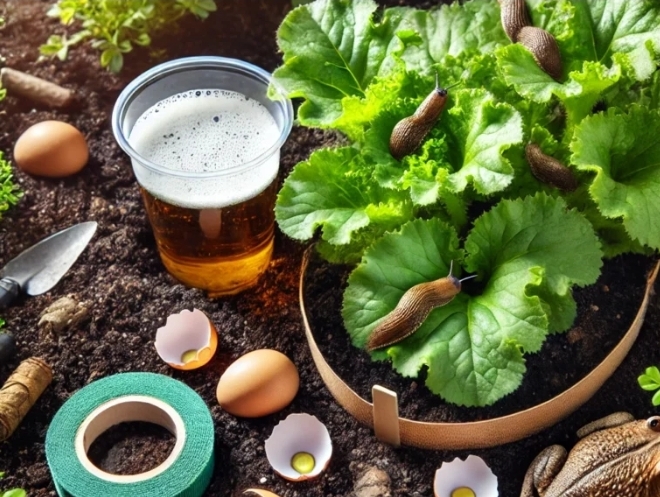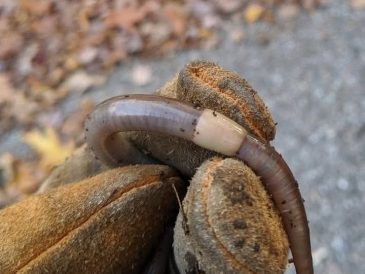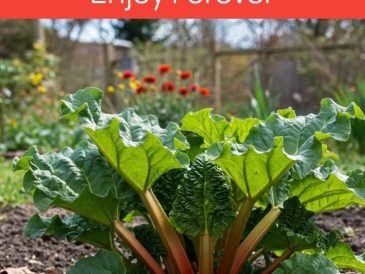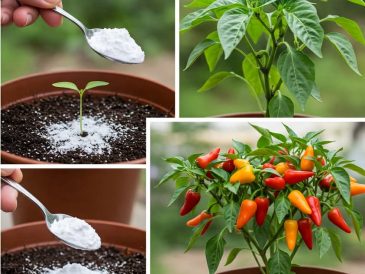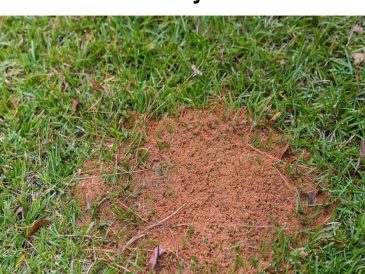Slugs and snails can be a gardener’s worst nightmare. They feast on tender leaves, seedlings, and vegetables, leaving behind unsightly holes and damaged plants. While chemical slug pellets are an option, they can harm beneficial insects, pets, and wildlife. The good news? There are plenty of natural, eco-friendly ways to keep slugs and snails at bay without resorting to toxic chemicals.
Here are eight effective, natural methods to protect your plants from these slimy invaders!
1. Create a Barrier with Crushed Eggshells or Diatomaceous Earth
Slugs and snails hate crawling over rough, sharp surfaces. Using materials like:
– Crushed eggshells
–Diatomaceous earth
– Sharp sand or gravel
… creates a physical barrier that deters them. The sharp edges irritate their soft bodies, making them turn away.
🔹 How to use it:
- Sprinkle a thick layer around the base of your plants.
- Reapply after heavy rain.
2. Use Copper Tape or Copper Wire
Copper gives slugs and snails a mild electric shock when they touch it, keeping them from crossing.
🔹 How to use it:
- Wrap copper tape around pots, raised beds, or plant stems.
- Place copper wire around garden beds to create a protective barrier.
This method is long-lasting and effective, making it one of the best defenses!
3. Encourage Natural Predators
One of the most sustainable ways to control slugs and snails is to let nature do the work!
– Frogs and toads – Love eating slugs. A small pond can attract them.
– Ducks and chickens – If you keep poultry, let them roam in the garden.
– Hedgehogs and birds – These natural predators help keep slug populations down.
🔹 How to attract them?
- Provide shelter (log piles, hedges, or a small pond).
- Avoid pesticides, which can harm beneficial wildlife.
4. Handpick at Night & Use a Beer Trap
Slugs are most active at night and after rain. One simple way to reduce their numbers is:
– Go slug hunting in the evening and manually remove them.
– Set up beer traps – Bury a shallow container filled with beer. Slugs are attracted to it and drown.
Tip: Dispose of collected slugs far from your garden to prevent others from being drawn to the scent.
5. Grow Slug-Repelling Plants
Some plants naturally repel slugs due to their strong scent or texture. Plant these around vulnerable crops for added protection:
Lavender – The scent repels slugs.
– Rosemary & Thyme – Their strong aroma deters pests.
– Ferns – Slugs dislike their tough leaves.
–Garlic & Onions – Both contain sulfur compounds that slugs avoid.
🔹 How to use this method?
- Plant slug-repellent herbs around the edges of your vegetable garden or flower beds.
6. Water in the Morning, Not at Night
Slugs love damp environments, and watering your plants at night creates the perfect conditions for them to thrive.
🔹 Solution:
– Water in the morning so the soil dries before nightfall.
–Use drip irrigation or watering cans instead of sprinklers to avoid excessive moisture.
Drier soil means fewer slugs!
7. Mulch with Coffee Grounds or Pine Needles
Slugs dislike strong-smelling and acidic materials like:
–Used coffee grounds – The caffeine can repel and even kill slugs.
– Pine needles – The acidity discourages slugs from crawling over.
🔹 How to use it?
- Sprinkle coffee grounds or pine needles around the base of plants.
- Reapply after heavy rain for continued effectiveness.
8. Trap & Relocate Using Grapefruit Halves or Wooden Boards
If you prefer a humane method, you can trap slugs and relocate them.
🔹 How to do it:
- Place an overturned grapefruit half or melon rind in the garden overnight. Slugs will gather inside.
- Lay wooden boards or damp cardboard in slug-prone areas. Slugs hide underneath during the day, making them easy to collect.
Tip: Relocate slugs at least 20 meters away from your garden, or they will return!
Final Thoughts
Using these natural and effective methods, you can control slugs and snails without harming the environment. Instead of relying on harmful pesticides, try a combination of these strategies for the best results:
✔ Physical barriers (eggshells, diatomaceous earth, copper)
✔ Natural predators (birds, frogs, hedgehogs)
✔ Smart planting (repellent plants & proper watering)
No more destroyed plants – just a healthy, thriving garden!

